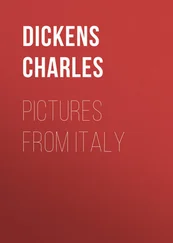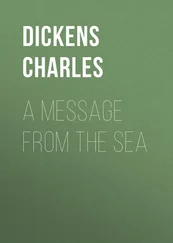Charles Dickens - Pictures from Italy
Здесь есть возможность читать онлайн «Charles Dickens - Pictures from Italy» весь текст электронной книги совершенно бесплатно (целиком полную версию без сокращений). В некоторых случаях можно слушать аудио, скачать через торрент в формате fb2 и присутствует краткое содержание. Жанр: Классическая проза, на английском языке. Описание произведения, (предисловие) а так же отзывы посетителей доступны на портале библиотеки ЛибКат.
- Название:Pictures from Italy
- Автор:
- Жанр:
- Год:неизвестен
- ISBN:нет данных
- Рейтинг книги:5 / 5. Голосов: 1
-
Избранное:Добавить в избранное
- Отзывы:
-
Ваша оценка:
- 100
- 1
- 2
- 3
- 4
- 5
Pictures from Italy: краткое содержание, описание и аннотация
Предлагаем к чтению аннотацию, описание, краткое содержание или предисловие (зависит от того, что написал сам автор книги «Pictures from Italy»). Если вы не нашли необходимую информацию о книге — напишите в комментариях, мы постараемся отыскать её.
Pictures from Italy — читать онлайн бесплатно полную книгу (весь текст) целиком
Ниже представлен текст книги, разбитый по страницам. Система сохранения места последней прочитанной страницы, позволяет с удобством читать онлайн бесплатно книгу «Pictures from Italy», без необходимости каждый раз заново искать на чём Вы остановились. Поставьте закладку, и сможете в любой момент перейти на страницу, на которой закончили чтение.
Интервал:
Закладка:
There lies all Genoa, in beautiful confusion, with its many churches, monasteries, and convents, pointing up into the sunny sky; and down below me, just where the roofs begin, a solitary convent parapet, fashioned like a gallery, with an iron across at the end, where sometimes early in the morning, I have seen a little group of dark-veiled nuns gliding sorrowfully to and fro, and stopping now and then to peep down upon the waking world in which they have no part. Old Monte Faccio, brightest of hills in good weather, but sulkiest when storms are coming on, is here, upon the left. The Fort within the walls (the good King built it to command the town, and beat the houses of the Genoese about their ears, in case they should be discontented) commands that height upon the right. The broad sea lies beyond, in front there; and that line of coast, beginning by the light-house, and tapering away, a mere speck in the rosy distance, is the beautiful coast road that leads to Nice. The garden near at hand, among the roofs and houses: all red with roses and fresh with little fountains: is the Acqua Sola—a public promenade, where the military band plays gaily, and the white veils cluster thick, and the Genoese nobility ride round, and round, and round, in state-clothes and coaches at least, if not in absolute wisdom. Within a stone's-throw, as it seems, the audience of the Day Theatre sit: their faces turned this way. But as the stage is hidden, it is very odd, without a knowledge of the cause, to see their faces changed so suddenly from earnestness to laughter; and odder still, to hear the rounds upon rounds of applause, rattling in the evening air, to which the curtain falls. But, being Sunday night, they act their best and most attractive play. And now, the sun is going down, in such magnificent array of red, and green, and golden light, as neither pen nor pencil could depict; and to the ringing of the vesper bells, darkness sets in at once, without a twilight. Then, lights begin to shine in Genoa, and on the country road; and the revolving lanthorn out at sea there, flashing, for an instant, on this palace front and portico, illuminates it as if there were a bright moon bursting from behind a cloud; then, merges it in deep obscurity. And this, so far as I know, is the only reason why the Genoese avoid it after dark, and think it haunted.
My memory will haunt it, many nights, in time to come; but nothing worse, I will engage. The same Ghost will occasionally sail away, as I did one pleasant autumn evening, into the bright prospect, and sniff the morning air at Marseilles.
The corpulent hairdresser was still sitting in his slippers outside his shop-door there, but the twirling ladies in the window, with the natural inconstancy of their sex, had ceased to twirl, and were languishing, stock still, with their beautiful faces addressed to blind corners of the establishment, where it was impossible for admirers to penetrate.
The steamer had come from Genoa in a delicious run of eighteen hours, and we were going to run back again by the Cornice road from Nice: not being satisfied to have seen only the outsides of the beautiful towns that rise in picturesque white clusters from among the olive woods, and rocks, and hills, upon the margin of the Sea.
The Boat which started for Nice that night, at eight o'clock, was very small, and so crowded with goods that there was scarcely room to move; neither was there anything to cat on board, except bread; nor to drink, except coffee. But being due at Nice at about eight or so in the morning, this was of no consequence; so when we began to wink at the bright stars, in involuntary acknowledgment of their winking at us, we turned into our berths, in a crowded, but cool little cabin, and slept soundly till morning.
The Boat, being as dull and dogged a little boat as ever was built, it was within an hour of noon when we turned into Nice Harbour, where we very little expected anything but breakfast. But we were laden with wool. Wool must not remain in the Custom-house at Marseilles more than twelve months at a stretch, without paying duty. It is the custom to make fictitious removals of unsold wool to evade this law; to take it somewhere when the twelve months are nearly out; bring it straight back again; and warehouse it, as a new cargo, for nearly twelve months longer. This wool of ours, had come originally from some place in the East. It was recognised as Eastern produce, the moment we entered the harbour. Accordingly, the gay little Sunday boats, full of holiday people, which had come off to greet us, were warned away by the authorities; we were declared in quarantine; and a great flag was solemnly run up to the mast-head on the wharf, to make it known to all the town.
It was a very hot day indeed. We were unshaved, unwashed, undressed, unfed, and could hardly enjoy the absurdity of lying blistering in a lazy harbour, with the town looking on from a respectful distance, all manner of whiskered men in cocked hats discussing our fate at a remote guard-house, with gestures (we looked very hard at them through telescopes) expressive of a week's detention at least: and nothing whatever the matter all the time. But even in this crisis the brave Courier achieved a triumph. He telegraphed somebody (I saw nobody) either naturally connected with the hotel, or put EN RAPPORT with the establishment for that occasion only. The telegraph was answered, and in half an hour or less, there came a loud shout from the guard-house. The captain was wanted. Everybody helped the captain into his boat. Everybody got his luggage, and said we were going. The captain rowed away, and disappeared behind a little jutting corner of the Galleyslaves” Prison: and presently came back with something, very sulkily. The brave Courier met him at the side, and received the something as its rightful owner. It was a wicker basket, folded in a linen cloth; and in it were two great bottles of wine, a roast fowl, some salt fish chopped with garlic, a great loaf of bread, a dozen or so of peaches, and a few other trifles. When we had selected our own breakfast, the brave Courier invited a chosen party to partake of these refreshments, and assured them that they need not be deterred by motives of delicacy, as he would order a second basket to be furnished at their expense. Which he did—no one knew how—and by-and-by, the captain being again summoned, again sulkily returned with another something; over which my popular attendant presided as before: carving with a clasp-knife, his own personal property, something smaller than a Roman sword.
The whole party on board were made merry by these unexpected supplies; but none more so than a loquacious little Frenchman, who got drunk in five minutes, and a sturdy Cappuccino Friar, who had taken everybody's fancy mightily, and was one of the best friars in the world, I verily believe.
He had a free, open countenance; and a rich brown, flowing beard; and was a remarkably handsome man, of about fifty. He had come up to us, early in the morning, and inquired whether we were sure to be at Nice by eleven; saying that he particularly wanted to know, because if we reached it by that time he would have to perform Mass, and must deal with the consecrated wafer, fasting; whereas, if there were no chance of his being in time, he would immediately breakfast. He made this communication, under the idea that the brave Courier was the captain; and indeed he looked much more like it than anybody else on board. Being assured that we should arrive in good time, he fasted, and talked, fasting, to everybody, with the most charming good humour; answering jokes at the expense of friars, with other jokes at the expense of laymen, and saying that, friar as he was, he would engage to take up the two strongest men on board, one after the other, with his teeth, and carry them along the deck. Nobody gave him the opportunity, but I dare say he could have done it; for he was a gallant, noble figure of a man, even in the Cappuccino dress, which is the ugliest and most ungainly that can well be.
Читать дальшеИнтервал:
Закладка:
Похожие книги на «Pictures from Italy»
Представляем Вашему вниманию похожие книги на «Pictures from Italy» списком для выбора. Мы отобрали схожую по названию и смыслу литературу в надежде предоставить читателям больше вариантов отыскать новые, интересные, ещё непрочитанные произведения.
Обсуждение, отзывы о книге «Pictures from Italy» и просто собственные мнения читателей. Оставьте ваши комментарии, напишите, что Вы думаете о произведении, его смысле или главных героях. Укажите что конкретно понравилось, а что нет, и почему Вы так считаете.












